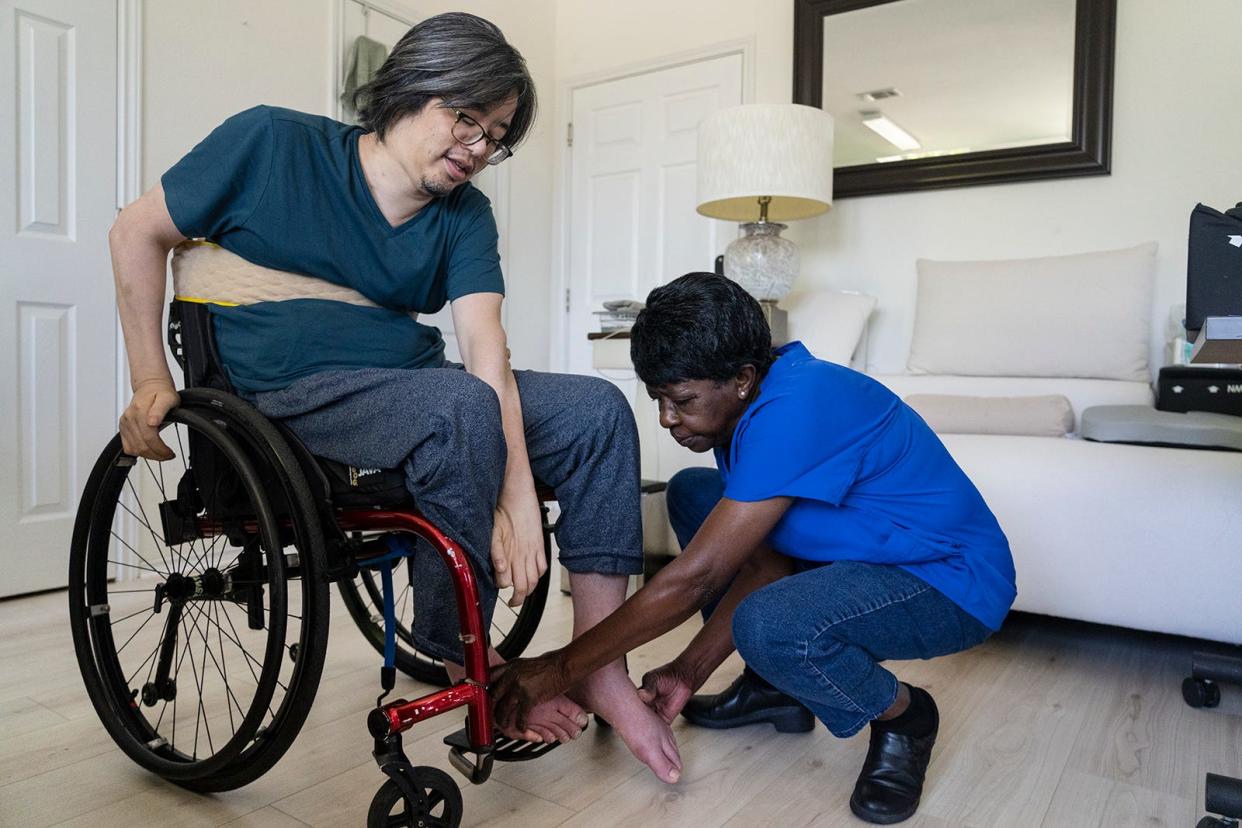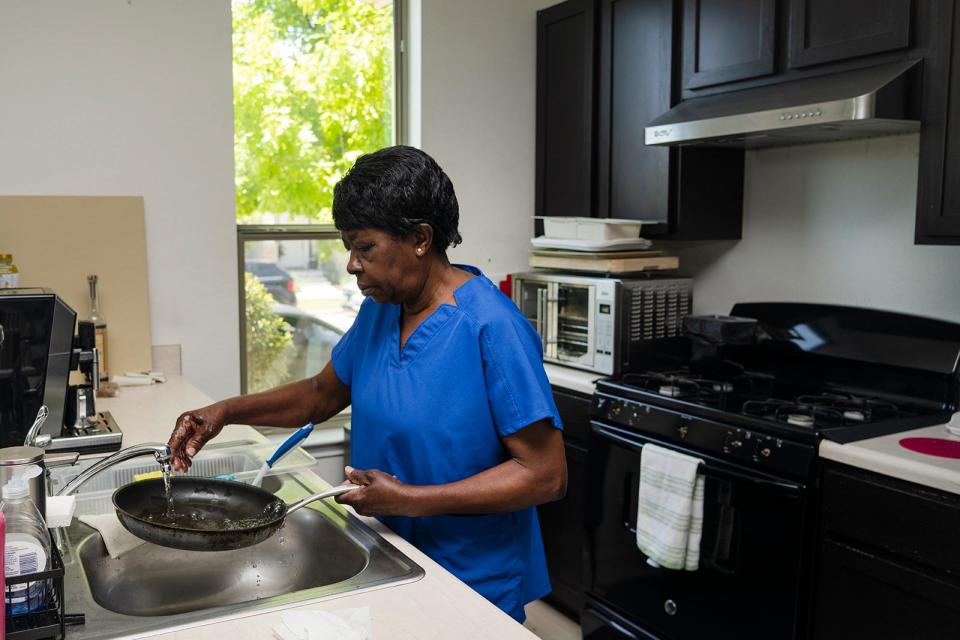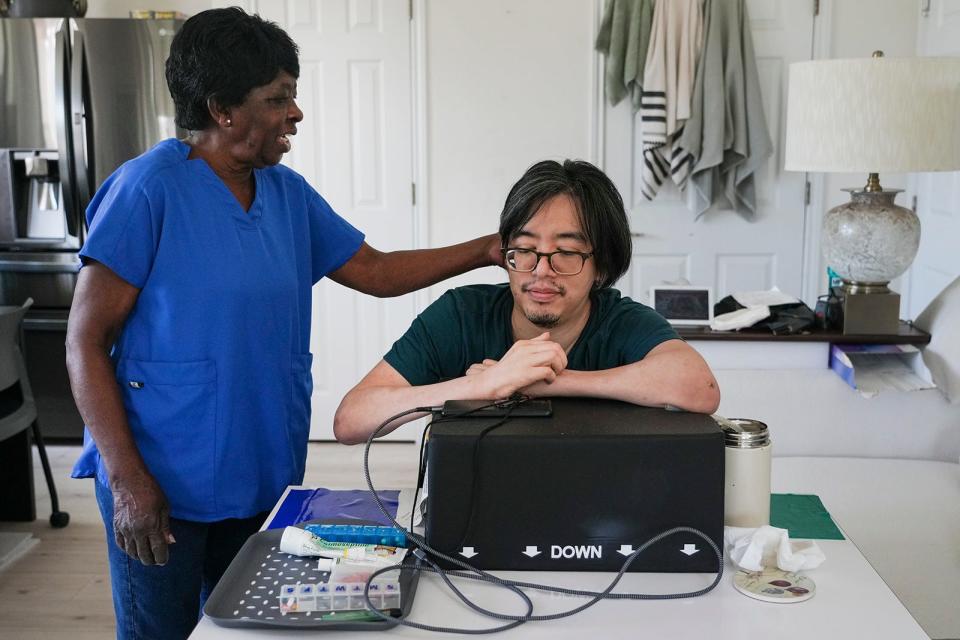Grumet: Even with a 30% raise, Texas caregivers may qualify for food stamps

Shirley Eason sounds so casual about it — “I just like helping people” — you might think she’s talking about running an errand for a friend.
But no. She’s talking about spending more than an hour navigating public transit, to get to a job that barely covers her bills, to serve as the lifeline for a man in a wheelchair who needs help with everything from getting out of bed to using the bathroom.
“You sound like a church person,” Tommy Dang teased Eason, who provides his in-home care 22 hours a week. Eason flashed a knowing smile, and then helped Dang, 44, prop up his feet on the sofa. Then, she brought over a warm turkey and cheese sandwich folded into pita bread.
“We have a reward coming,” said Eason, 77, nodding toward the afterlife.
The here and now is another story.
Personal care attendants in Texas are so egregiously underpaid that even though the Legislature just boosted their base wages by 30% — from $8.11 to $10.60 an hour, effective Sept. 1 — many caregivers could still be poor enough to qualify for food stamps and subsidized housing.
Disability rights’ advocates had higher hopes for a session that started with an historic $33 billion surplus. It would have cost the state $2.6 billion, plus an additional $4 billion in federal money, to raise attendants’ hourly pay to $15 now and then $17 in two years, as advocates urged.
Instead, a big chunk of the surplus is going to some form of tax cuts that many Texans might not even notice.
Emphasizing that the bump to $10.60 an hour is better than nothing, disability rights advocates say lawmakers need to make similar increases to attendants’ pay in the next few legislative sessions to catch up with inflation and the realities of the job market.
“There's a sign at the Jimmy John's around the corner from my office that says $20 an hour to deliver sandwiches,” said Dennis Borel, executive director of the Coalition of Texans with Disabilities. “I mean, why would you work for half of that?”

Eason is better off than some. Her employer pays $11 an hour, in part because her client needs extra care. She’s also fortunate to own her Austin home.
“If I hadn’t gotten my property in the ‘70s, I couldn’t be doing caretaking,” Eason told me. “It’s not enough money.”
The cost of not meeting the need
As the American-Statesman has reported for years, the low pay means a devastating shortage of attendants, leaving thousands of disabled Texans on Medicaid unable to get the care they need. Attendants leave the job, on average, after just eight months. Some providers say their Medicaid clients are receiving only half of their approved hours of service — assistance with eating, personal hygiene and other functions of daily life.
Dang searched for months before connecting with Eason. He still can’t find a second attendant to provide the other 18 hours a week of care he needs. He relies on Eason for almost everything.
“When she’s here, I try to eat as much as I can,” Dang said.
Spinal cord injuries from a motorcycle accident, worsened by surgical complications, have drained much of the feeling and movement from his hands. The former sushi chef can no longer cook for himself.
Without the in-home care they need, disabled Texans are at greater risk of being hospitalized or placed in a nursing home, which would cost taxpayers substantially more.
“We’re going to start seeing that some people are going to get institutionalized, or some people are just going to die,” said Cathy Cranston, an organizer with the Personal Attendant Coalition of Texas, who has worked for years with ADAPT of Texas to push for sustainable wages for attendants.

She and others saw hope in Gov. Greg Abbott’s budget message earlier this year, which urged lawmakers to “provide the funds necessary to increase the rates paid to maintain safe and comfortable homes for some of our most vulnerable Texans.”
But at this point, the governor hasn’t pushed for anything beyond the $10.60 base wage that lawmakers funded. His office did not respond to my inquiries on the issue.
Taking the first step
This is not just a policy issue to Rep. Donna Howard, the Austin Democrat who led the push in the House for a $15 base wage. A couple of years ago, she paid out of pocket for an attendant to help her care for her husband, Derek, during the final months of his life, as he struggled with mobility and cognitive issues from a brain injury.
“It was wearing me down to provide the care,” Howard told me. “It’s physically exhausting.” At one point, she injured her shoulder while helping her husband move around.
“On top of that, because of the cognitive impairment, you also sometimes have to suffer a certain amount of abuse and recognize that it's not part of the person, it's part of the disease or the disability,” she continued. “So it’s a very challenging job, when you could make $15 an hour flipping burgers.”
Howard said it’s “unconscionable” that lawmakers failed to pass a $15 base wage for attendants when they had a record surplus to work with.
Notably, there’s a yawning gap in representation here. The Legislature is mostly male and white, with largely affluent members who can afford to be part-time lawmakers. Even if they have had a loved one who needed care, they probably didn’t rely on Medicaid to provide it.
Meanwhile, the vast majority of state-funded attendants are women (88%) and people of color (76%), working a low-wage job, often with no paid holidays or benefits.
“I don't believe we're a truly representative body in terms of what many Texans do have to face, and so I think that has an impact on the choices that we make and where our priorities are,” Howard said.
The bump to $10.60 provides a starting point, something to build on. But it won't bring a surge of new attendants to Tommy Dang and thousands of other Texans who need them, not when less demanding work still pays considerably more.
For Dang, having an attendant means having morning coffee and a real lunch, having clean sheets, having help cleaning himself and bandaging his wounds, and ensuring there's no broken glass or spilled drinks on the floor. It means having someone to talk to and joke around with.
"I'm very lucky," he said. But that's only for the part-time hours that Eason is there.
Grumet is the Statesman’s Metro columnist. Her column, ATX in Context, contains her opinions. Share yours via email at bgrumet@statesman.com or via Twitter at @bgrumet. Find her previous work at statesman.com/news/columns.
This article originally appeared on Austin American-Statesman: Grumet: Raises for personal care attendants are overdue but not enough

